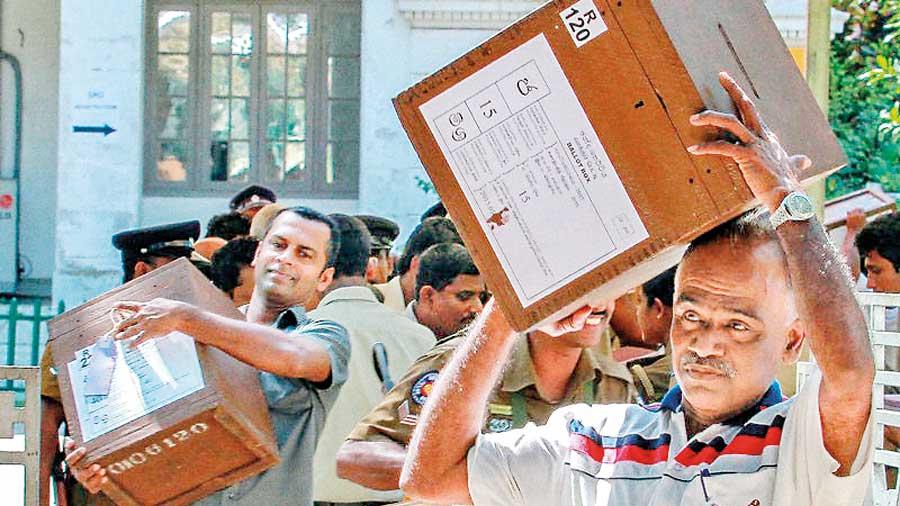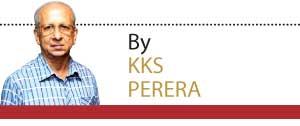30 Jan 2023 - {{hitsCtrl.values.hits}}

File photo
Sri Lanka has a history of forming political Alliances for well over a century, the first being Ceylon National Association founded in 1888 and Ceylon Reform League founded in 1917 joining hands on December 11,1919 in forming a new political alliance called Ceylon National Congress [CNC].
Association founded in 1888 and Ceylon Reform League founded in 1917 joining hands on December 11,1919 in forming a new political alliance called Ceylon National Congress [CNC].
‘Ridiculous political alignments’ are being transformed into alliances on the ‘eve’ of the LG elections. Alliance can be defined as an official agreement between two groups, organizations or nations, etc. to work together, for common support and cooperation, so as to attain a certain objective. The affiliates in the alliance are known as allies. In political vocabulary, alliance is a cluster of parties associated to contest an election and win it together under a multi-party system. On the contrary, Coalition denotes to the partnership of two or more political parties or groups, subsequent to the announcement of results, and if no political party earned a majority to establish the government, two or more parties join together to share power.
There are no coalitions in the opposition, but happens in governments, and vice versa. When a number of parties contest polls and more than two parties have a winning chance, either according to the seats earned by them on their own or by creating a coalition with other parties they form governments.
In an alliance, the political parties pool their resources and work cooperatively, to defeat a common enemy and maximize their vote share. Coalition politics, mostly selfish, had been an enduring feature since its independence in 1948.
This phenomenon has widened the opportunities for participation in governance for minority and small parties. There are valuable changing aspects of party politics that are discovered in the politics of coalition regimes. The evolution of our electoral democracy, party and electoral systems, and the impact of ethnic politics of regime formation as well as making and breaking up of coalition regimes have proved to be very effective in the democratic tradition in our political history. Therefore, formation of alliances and coalitions, whether shameless or prudish needs to be welcome.
2018 LG Elections
The results of local government elections held on February 10, 2018, caused unanticipated political chaos. The newly-formed SLPP secured 231 local councils out of 341. The resounding victory of Mahinda Rajapaksa’s party aggravated the rift between ruling ‘Yahapalana’ coalition leaders Maithripala Sirisena and Ranil Wickremesinghe. The future of the ‘National Unity coalition’ was in doubt. An election at the lowest level of government managed to cause shocks of such extent in Sri Lankan politics. The major political parties see the upcoming March 9, 2023 LG elections as an occasion to compete for supremacy before the next big election. Will the public treat the elections as a vote on national issues? There does not seem to be any degree of interest by them though.
Sinhalese nationalists and extremist elements perceived the 2018 LG elections as an opportunity to ‘correct their historical mistake’ in 2015 by voting for Rajapaksas once again.
Lankan politicians are desperate for grabbing power [Rs.10bn is summa] or remain in power [Rs.10 bn is unaffordable], while skyrocketing prices, low crop yields, and a drop in the rupee’s value since mid-March 2022 – have made even basic supplies unaffordable. The risk of prevalent global food insecurity and malnutrition among children is growing. The International Monetary Fund Executive Director for India and India’s former Chief Economic Advisor, Dr. K.V. Subaramanian asserted that ‘the approach by the central banks across the globe in setting the framework post great financial crisis has failed miserably in stimulating growth’, while delivering a lecture at the Central Bank on January 26. High prices and inflation that have hit even the developed nations have caused tremendous problems in an already bankrupt country. We have never faced this kind of economic disintegration. Through 30 years of war, we maintained a relatively fair standard of living, with a functioning welfare state. The rapid decline in living standards is disturbing for all but the super-rich and lies in nearly collective anger at the administration.
History of Alliances and Coalitions
The CNC formed in 1919 was a nationalist political party led by Sir Ponnambalam Arunachalam and Sir James Peiris loyally supported by FR and DS Senanayake, DB Jayatilaka, EW Perera, and CWW Kannangara. At the end of 1942, DS Senanayake pointed towards his displeasure with the novel policies and the new outlook of Congress, and he resigned from the Exco of CNC. By 1943 he severed all relations with it. DS had an idea of forming a national political party with moderate views to represent a national consensus; a party necessarily of the majority, but acceptable to the Tamils and Muslims.
The newly formed Department of Elections conducted the first Parliamentary poll from August 23 to September 20, 1947, before independence under the new Soulbury Constitution. DS formed the first super alliance called United National Party, by amalgamating three right-leaning political forces of the day, namely, the Sinhala Maha Sabha of SWRD Bandaranaike, [the strong political entity formed on the lines of the Indian National Congress], the Ceylon National Congress, and TB Jayah’s Muslim League. Results –UNP 39% and 42 seats; Marxist 20 and 18 & North -8 &13; Independents—30& 21 others—2&1--total 95 seats. UNP fell short of the required majority, but DSS formed a coalition government with Tamil Congress and Independents.
In 1956 SWRD Bandaranaike, the former UNP second-in-command who quit the party in 1951, was passionate about forming an alliance with Philip Gunawarden’s VLSSP, the Bhasha Peramuna of W. Dahanayake and several independents like TB Subasinghe, IMRA Iriyagolla, who came forward to support his SLFP. The grand alliance, the Mahajana Eksath Peramuna (MEP) was formed on February 21, 1956, and they signed a no-contest pact too with the powerful left, LSSP, and swept the board at elections held in April ’56 and formed the second coalition government.
Following the tragic death of SWRD in 1959, two elections were held four months apart in March and July 1960. Both elections were held cleanly with no alliances by either of the two main players, but both the UNP and SLFP failed to gain a working majority. In July as Sirimavo B officially took leadership of the SLFP, it won with a healthy margin and formed a government. A year later the main leftist LSSP joined in a coalition and it was heading steadily for the fifth year, when a conspiracy by the opposition successfully ousted it by inducing several MPs under second-in-command CP de Silva to crossover to the opposition in December 1964.
Super Alliance of 1965
Dudley Senanayake, the leader of UNP formed the second super alliance to oppose the SLFP-led alliance with Marxists in 1965. He also agreed to give cabinet posts both to a number of small Sinhala nationalist parties that included Philip Gunawardena’s MEP, Racist KMP Rajaratna, IMRA Iriyagolla and W. Dahanayake, and some Northern Parties. It was considered the most prudent of all alliances that brought together opposing groups with diverse ideological views; the Sinhala racist, Tamil nationalist, Marxists, and ultra-right-wing leaders appeared on to the same platform. They won only 66 seats in a house of 151, but in a coalition with Northern ITKA’s 14 seats Dudley, the statesman successfully launched a ‘National Administration’ that lasted its full term of five years for the first time in history.
1970 saw SLFP-led alliance of LSSP/CP, called United Front sweeping the board for a two-thirds majority which failed to continue when differences erupted disturbing the unity in 1975.
24 Apr 2024 32 minute ago
24 Apr 2024 43 minute ago
24 Apr 2024 1 hours ago
24 Apr 2024 2 hours ago